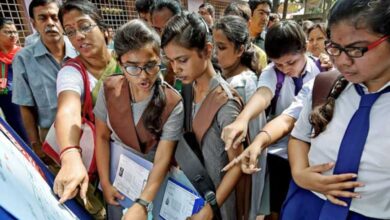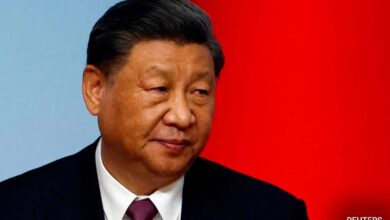Amid Centre’s bid to tighten Indo-Myanmar border, why Mizoram, Nagaland are silent | Political Pulse News
The BJP-ruled Centre has made various interventions in recent months to regulate the entry of foreigners into Indo-Myanmar border states in the Northeastern region, which are watching these moves closely. So far, however, even those states like Mizoram and Nagaland have maintained silence over it, who have been in favour of porous borders with the neighbouring country.
Last month, the Centre reimposed the Protected Area Regime (PAR) in Manipur, Mizoram and Nagaland, thirteen years after it had been rolled back from such Indo-Myanmar border states in a bid to boost tourism. Under the PAR, a foreign national is not allowed to visit these belts unless “it is established to the satisfaction of the Government that there are extraordinary reasons to justify such a visit”, which is contingent on a permit issued by the Union Ministry of Home Affairs (MHA).
Another key central intervention has come into effect this month to amend the Free Movement Regime (FMR). Last year, the Centre had announced that it would scrap the FMR, facing a backlash not just from the civil society but also from across the political spectrum – including the BJP – in Nagaland and Mizoram as well as from Manipur’s Naga and Kuki-Zo communities. With resistance continuing against its announcement, the Centre sent communications to the governments of Manipur, Mizoram and Nagaland in late December, directing them to implement an amended and firmer FMR system instead.
Based on a mutual agreement with Myanmar, the FMR allowed tribes living along the porous borders in either country to travel up to 16 km inside the other country without a visa and stay up to two weeks.
According to the amended FMR protocol, people residing within 10 km of the borders in both countries can visit each other with a border pass valid for seven days issued by the Assam Rifles. People wanting to enter through the designated border crossings now have to produce proof of residence within 10 km of the international borders issued by the local police station or a village chief or any government-recognised authority.
While the Centre’s announcement to scrap the FMR had been welcomed by the Biren Singh-led BJP government in Manipur, it met with stiff opposition from Mizoram and Nagaland. The Biren government has held alleged illegal immigration from Myanmar as one of the prime factors responsible for the ethnic conflict raging between Meiteis and Kuki-Zos in the state since May 2023.
Mizos and Myanmar’s Chins share the same ethnicity, even as there is a sizeable Naga population in Myanmar, largely in the Naga Self-Administered Zone in the neighbouring country’s Sagaing region. In both cases the communities on the two sides share a close bond.
Both the NDPP-BJP government in Nagaland and the Zoram People’s Movement (ZPM) government in Mizoram had passed resolutions against the Centre’s announcement to scrap the FMR, while there had been sustained protests against it on the ground.
The recent tightening of the FMR has, however, been protested by only a few bodies like the Zo-Reunification Organisation (ZORO) based in Aizawl, which advocates for the integration of Zo people living in India, Burma and Bangladesh under one umbrella.
ZORO president R Sangkawia told The Indian Express that his organisation has a few key issues against the new FMR protocol. “First, many people living across the border have relatives in Aizawl and Lunglei in Mizoram. So permitting movement only for people residing within 10 km of the borders is not enough. If there has to be a border pass system, it should be open for everyone living in Mizoram. Secondly, just seven days of validity (for a border pass) is too little, it should be at least 15 days,” he said.
However, the Mizoram government as well as other key stakeholders in the state such as the Young Mizo Association have maintained a silence over this issue.
“The Mizoram government and the civil society want people to enjoy the FMR. We also want to welcome tourists without a restricted area policy but we are not opposing these new moves because we cannot do anything – it has already been decided by the Central government,” said a senior ZPM MLA, reflecting the party’s different approach from its sharp opposition to the Centre’s proposal to scrap the FMR.
Khriezo Yhome, a senior fellow from Nagaland at Asian Confluence – a Shillong-based think tank – who focuses on the Indo-Myanmar relations, suggested that the Centre’s new interventions indicate a “new way of dealing” with developments in the region without rocking sensitivities.
“These are obviously in response to what’s happening in Myanmar, given that the junta’s hold there has weakened, especially in border areas with ethnic resistance forces gaining control of them,” Yhome said.
“However, these moves (by the Centre) are also not significantly impacting people on the ground. Even with a new protocol, they are still allowed to move along both sides amid regulations. When the Home Minister had announced the scrapping of the FMR a year ago, it invited a very strong backlash. So these are alternatives formed to control border areas and get a firmer hand on what’s happening at the border and to bring in some regulations so that you know who’s coming in and going back,” he said.
A BJP leader from the region said that while it had been felt that there was a need to review the FMR, the unilateral proposal last year to scrap it had been a “wrong step” not just because of the backlash. “The declaration last year was a wrong step in the first place, most importantly for geopolitical relations and internal security. It is normal to review a failed policy but there are implications to provoking neighbouring countries. Now the FMR itself is not scrapped and these policies have been directed here instead,” the leader said.
Discover the Benefits of Our Subscription!
Stay informed with access to our award-winning journalism.
Avoid misinformation with trusted, accurate reporting.
Make smarter decisions with insights that matter.
Choose your subscription package







